This is the Archive Documenting Palestinian Life & History from Below
By preserving hitherto marginalised narratives, Palestinian Stories seeks to establish a collective memory that resists erasure.

“We inherit everything. Especially questions.”
The words of Palestinian-American author, poet and clinical psychologist Hala Alyan carry within their literary being a certain weight that can never be lifted; the idea of inheritance itself signifies a loss; a transition of memory, pain, and trauma. But most harrowing is the idea of inheriting questions, inheriting ambiguity. What is worse than inheriting loss than inheriting a loss the origins of which you cannot identify? Cannot remember? Do not know?
For over 75 years, such aching inheritance has knocked on Palestinians’ falling doors. Their loss is not simply an unfortunate aftermath of a ‘war,’ it is a deliberate, ongoing and unyielding campaign to completely erase the Palestinian identity by a fascist occupation desperately trying - and failing - to falsify history.
This is the story of ‘Hekayat Falasteneya’ - Palestinian Stories - a digital archive weaving a Palestinian-centred account of the past, present and future that will survive till the liberation of Palestine and beyond.
With an Egyptian father and a Palestinian mother, founder and director Samar Dowidar’s upbringing was enriched by the diverse backgrounds that surrounded her. Her maternal roots traced back to Palestine, while her grandmother hailed from Lebanon, and her extended family members came from various corners of the globe. This vibrant tapestry of cultural influences has left an indelible mark on her, fostering a deep appreciation for the richness and diversity of the world around her.
Her personal mission? To retrace the buried roots of Palestinian families lost to violent occupation forces; buried in the dirt or scattered in exile; one letter, image and document at a time.

Officially launched in June of 2023, PalestinianStories.com is, in essence, a call home…"All the stories of our ancestors that have reached us have lost a part of them each time they were told. But here and now, with the tools of our era, we can overcome this obstacle and save our memory by sharing and gathering the pieces of the puzzle from the stories of all our ancestors to paint a memory that resists forgetfulness,” so goes the welcome message on the website’s homepage.
The abundance of personal stories and artefacts unlocked through Dowidar's Palestinian Stories initiative offer a glimpse into facets of Palestinian lives that have long been overlooked in mainstream Zionist historical accounts. It is an attempt to document Palestinian history from below; as an open source archive, the initiative aims to lend itself to the accounts of the people, not just for historical events, but the day to day lives of Palestinians, pre, during and post Nakba.
Within the online space’s historical and cultural archives, some dating back to the 1910s, lie faces and exchanges that would have otherwise been forgotten in the drawer of a second or third generation displaced Palestinian family’s house someplace very far from home.

Rental contracts, marriage certificates, images of children on a school trip in Yafa, only scratch the surface of the Palestinian stories awaiting to be unearthed. Each entry on palestinianstories.com identifies the year, city of origin, and family from which the document was procured.
As of today, the website houses a limited number of personal Palestinian artefacts, when complete, the open-submission platform will allow exiled and dispossessed Palestinian families to digitally reconstruct the fabric of their communities. Individuals will be able to register familial archives, contribute artefacts and testimonials, connect with dispersed relatives, and collaboratively build a living digital representation of their rich yet consistently endangered social and cultural heritage.
Dowidar’s journey with the Palestinian Stories initiative began around six years ago, when her profound fascination with the intricate nature of identity, especially in the Palestinian context, reached feverish levels. During her time at the Center for Migration and Refugee Studies in the American University in Cairo, she honed her focus on the formation of identity and the concept of belonging among Palestinian women's children who had never experienced Palestine firsthand.
Through engaging interviews with twelve Palestinian women from diverse backgrounds, including Egypt, Jordan and Tunisia, Dowidar embarked on a quest to understand the multifaceted dimensions of their experiences. Little did she know that during this enlightening journey, the head of the research department would convey a transformative message: "You do not need to research, go tell your story."
“That research was personal to me; the question I was asking was my own. Palestine is my life,” Dowidar tells CairoScene. Before launching Palestinian stories, the academic tried her hand at writing a yet-unpublished novel on pre-nakba Palestine, citing - with consent - some of her interlocutors’ stories. Throughout her research, she would sit and search for details of everyday life in Palestine.

When Dowidar’s mother noticed how entrenched she was within this search for Palestinian meaning, she presented her with a gift that would change her life, a box filled with over 350 documents belonging to her grandfather; letters, official papers, documents of ownership, and personal memorabilia.
The primary content of the collection comprised letters penned by Dowidar's grandfather, Ali Shaath, during a period when he lived apart from his family due to work commitments that demanded his presence elsewhere. Shaath crafted these heartfelt letters, meticulously creating carbon copies of each correspondence for his personal archives. His innate organisational skills and foresight regarding the significance of preserving his words were evident even in those earlier times.
“These letters were personal, they were never meant to be published or shared. But it was as if a part of him knew that this would happen, as if a part of him had intended for this all along. The way he preserved these letters, he knew we would need them, he knew we would need the words, the stories,” Dowidar tenderly shares.
Shaath's letters provide a deeply personal and vivid glimpse into the daily realities, cultural milieu, and social fabric of Palestine during that era, offering a perspective unlike anything found in textbooks. Their emotional depth and nuanced storytelling captivate readers, transporting them to a bygone time. When Dowidar started showcasing her grandfather's letters on an international scale, the response was overwhelmingly positive.
"Each time these letters were shared with someone, they left an indelible impression. My grandfather's pen wielded a sharpness that elevated these letters beyond mere correspondence; they were literary treasures that demanded preservation," Dowidar shared with CairoScene.
The initial international exhibition of the letters took place at the Palestine Museum & Cultural Centre in the UK, marking a significant milestone in Dowidar's journey. Reflecting on the experience, she shared, "As an Arab, witnessing such overwhelming support from abroad was truly profound. People were genuinely moved by what they encountered. There existed a prevailing misconception that our culture lacked depth, so when Western audiences saw the archived images of my grandfather delivering lectures or attending the opera, they were astounded. They had no prior knowledge that this was the life we led in our homeland."

All too often, history books reflect the biases and perspectives of their authors rather than providing an objective representation of reality. Therefore, oral history projects and first-hand written archives that centre untold voices, like Palestinian Stories, are crucial for illuminating the intricate details and lived experiences absent from more popular and homogeneous narratives.
"The individuals who shape history do so through the lens of their own biases and perspectives," Dowidar asserts. "History often becomes a reflection of those who document it, rather than an accurate portrayal of what truly transpired. Through oral history, we gain access to a multitude of intricate stories that are rarely found within the pages of history books. It is the responsibility of researchers to delve beneath the surface, to read between the lines. This is where oral history assumes its vital role—the history of voices that have remained unwritten."
The value of oral documentation shines through in a recent video acquired by the Palestinian Stories initiative. Jamal Abu Rashed, a Palestinian residing in the United States, became aware of the project, triggering a profound recollection. In his sixties now, Abu Rashed vividly remembered a video he had filmed decades earlier—a poignant recording featuring his mother, Hajja Halima Eissa Rashed Abu Rashed, a resilient Palestinian farmer whose rural dialect remained unwavering and untarnished.
Back in 2002, Abu Rashed had recorded a video wherein his mother recounted her personal experience during the Nakba of '48, driven by a fervent desire for the world to bear witness and remember. Remarkably, this significant video had been buried within an old box of tapes in Abu Rashed's attic. Upon rediscovering it, he shared the precious footage with Dowidar, who is currently undertaking the vital tasks of digitising, transcribing and editing the material for an upcoming publication. While Hajja Halima passed away in February 2008, her compelling story will soon be brought to light. "I felt an immense sense of responsibility, knowing that I held a piece of his family's legacy entrusted to me," reflects Dowidar, deeply moved by the weight of this undertaking.
Operating fully through volunteer support and personal commitment rather than institutional funding, Dowidar acknowledges "Palestinian Stories is a personal effort; one that is exhausting and fulfilling." She has accomplished much through the hard work and dedication of others who "volunteer their time, effort, and love" to the cause. Committed to amplifying marginalised voices, Dowidar asserts, "I am not a company, I am not an NGO, I do not have funding, I am simply a woman with Palestinian stories to tell, and a plan to do so."

Taking responsibility for safely preserving the stories entrusted to her, Dowidar feels her grandfather gave her a gift, and a path to pursue with Palestinian Stories. Now more than ever, the project aims to establish Palestinians as "the primary source for history" by controlling their own narrative of the past, present and future.
While many aspects of palestinianstories.com are still under development, Palestinian Stories is gradually realising Dowidar's vision of fostering collective memory that resists brutal and systemic erasure.
Most importantly, Palestinian Stories leaves future generations with the resources to proudly claim their roots no matter how much has been lost. As Dowidar puts it, "these stories need to remain alive, every single one. We cannot afford to have our youth forget where they come from, where their land is or even what food their grandparents cooked..."
By equipping Palestinians worldwide with the tools to author their own narrative, document ongoing injustices and envision an independent Palestine, the initiative fights erasure on the deepest level. It passes the torch of collective memory and empowerment to new guardians committed to safeguarding history through a people's own words and stories.
To read the letters of Ali Shaath and view the personal artefacts mentioned throughout the article, head to https://palestinianstories.com/
Palestinian Stories also welcomes volunteers through their DMs on Instagram or through directly contacting Founder & Director Samar Dowidar at Sadowidar@gmail.com
Images courtesy of palestinianstories.com through the Shaath, Al-Rayes, Al-Hosry, Jarrah, and Moussa families from Palestine - may their stories remain alive.
- Previous Article سندباد الورد أضحي سلطاناً: مراجعة لألبوم شب جديد والناظر 'سلطان'
- Next Article Travel Across History on Egypt's Most Iconic Bridges
Related Articles
Trending This Week
SceneNow TV
Events Calendar




















